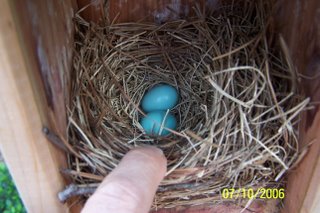I wasn't sure I'd ever see them again.
I noticed a chickadee looking over the bungalow. Later, I noticed twigs protruding from the sides of the nesting box. I had removed Bonnie Blue's nest once the chicks fledged. Imagine my surprise when I found another nest that looked exactly the same!
Someone had been busy!
I noticed a female wren trying to navigate a large pine needle through the entrance of the box, so I figured it must be a nest of wrens, even though it had all the characteristics of a bluebird nest.
I was wrong.
On Friday, there was a perfect sky blue egg in the nest! Wrens don't lay sky blue eggs.

For the next three days, I watched Bonnie Blue going in and out of the bungalow. I knew it was her and Mister because they immediately recognized the mealworm dish when I placed it near the condo. Also, they returned to their same perches as before.
Each day I would check the nesting box, and each day I found a new egg. By Monday, there were three!
That afternoon, I heard a ruckus outside my office window. There was Blue Velvet and Elijah Blue on the roof! Mister Blue brought them to see their mom while she laid the eggs!

Bluebirds can lay two to three clutches of eggs per season, but I never figured these two would have another brood so soon. I was thrilled, and I kept diligent watch.
The day after finding the third egg and seeing the older fledglings, I once again checked the box. This time, one egg was missing, and I began to get concerned.

A raccoon, a snake, a wren, or a house sparrow can remove one egg from a nest without disturbing the others. In this case, it would've been impossible for a raccoon to get an arm inside the box with the veranda on it. I didn't really think it was a snake. I suspected it was the wren. In the days to follow there were no more eggs missing. But Bonnie Blue was nowhere to be seen.
House sparrows are mortal enemies of the bluebird. They are known to remove the eggs, kill the nestlings, and kill the adult. I suspect this could be what happened, but I don't know. I haven't seen any house sparrows in my yard.
Since the loss of the first egg, I've seen no bird at all checking out the birdhouse, although I did see Mister Blue fly into the box this morning. I wonder if he was looking for Bonnie Blue, or was he merely checking on the condition of the remaining eggs?
The eggs can go for about a week without having to be incubated, but, once begun, the female must remain diligent in keeping the eggs warm. Furthermore, only the female can incubate the eggs. The male has no "pouch" with which to cover them.
PostScript: This morning I found the remaining two eggs broken on the ground beneath the nesting box. I suspect it was another bird's handiwork. Probably the wren. I will watch to see who starts to build in the box, and may or may not discard that nest before it's used. I'd like to reserve the box for bluebirds even if I have to plug the hole until next spring. Nest box inhabitants can grow to be territorial.
